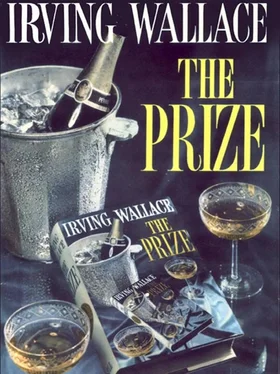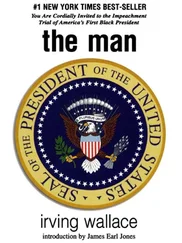‘None other,’ said Garrett, rising, all restraint cast aside. ‘I suppose the reporter, Miss Wiley, I suppose she took notes? She did, didn’t she?’
‘Why, of course.’ He lifted the newspaper from his desk. ‘She filed the story last night. The Swedish papers picked it up today.’
‘And it’s all about that bastard Farelli?’
‘I-I-uhhh-yes, I mean-naturally, the new Nobel laureate comes to our hospital to pay his respects-offers to advise us on an important patient, a royal patient in critical condition-it is a story, naturally-uhhh, Dr. Garrett, I cannot understand-you are so upset-what is it? Is there something I should know?’
‘You’re damn right there’s something you should know.’ Garrett’s lips worked, and steadily he pounded a fist of one hand into the palm of the other. ‘You sit down,’ he commanded. ‘I’m going to give you an earful about that charlatan Farelli-trying to use you-making fools of both of us-and the Nobel Committee besides-now, sit down.’
Dazed, Dr. Öhman sat down, staring up at his deity, who had so suddenly been transformed into a vengeful Mars, and slowly, with relentless hatred, Mars began the case for the prosecution.
Carl Adolf Krantz, who, among other human frailties, was a hypochondriac, had fortified himself against the freezing weather with earmuffs beneath his hat, a swath of knitted muffler, a bearish overcoat, and it was with difficulty that he was able to manœuvre the Mercedes-Benz sedan into the parking area outside the vast glass-and-metal Bromma Air Terminal.
He knew that he was late, and the moment that he left the car, this disgraceful fact was confirmed by the Arrival and Departure Board. The Czechoslovakian Airlines four-engine plane-an early morning telegram had informed him that it was leaving two hours earlier than scheduled, and so would arrive two hours earlier-had taken off from the Schönfeld Airport in East Berlin at 9.55 in the morning and was expected in Stockholm, en route to Helsinki, at 12.55. It was now 1.06. An immediate inquiry calmed Krantz’s nerves. The passengers from East Berlin were still going through customs.
Outside, near the rows of windowpanes and the Royal Waiting Hall, Krantz removed his earmuffs, fearing their absurdity, and tucked them inside his coat pocket. He wondered if Dr. Hans Eckart had looked for him, before going into customs. Had Krantz been able to hire a chauffeur for the morning, as he had wished, there would have been no tardiness. But he knew, understanding his visitor, that Eckart would have severely disapproved. He and Eckart had private matters to discuss, and Eckart was, above all things, cautious, and a third party in the car would have been inhibiting. It was too bad, because a chauffeur would have readily fixed the flat tyre of the Mercedes that Krantz had so lavishly hired on Klarabergsgatan at twenty kronor for the day (minus ten per cent discount for the winter season) plus twenty-five öre for every kilometre to be driven. Without the chauffeur, Krantz had wasted precious time hunting for a garage and, beyond that, he had probably driven the rim through the deflated tyre, which would force a costly penalty upon him. Still, these expenses were minor, and the irritations minor too, when he considered the importance of his meeting with Eckart.
As he thought of their reunion, Krantz’s spirits lifted. The assignment that Eckart had so mildly suggested in East Berlin, more than a year ago, one that had seemed so impossible at the time, had now culminated in complete success. Krantz had done his job magnificently, and Eckart must deliver what he had promised. In that sense, the German physicist’s arrival in Stockholm was today not only a congratulation but a guarantee of payment. Severe as the day was, Krantz shivered with warm anticipation at the guttural assurances that would soon give him the prestige and security that had become his full-time obsession, ever since the vacant chair of physics at the University of Uppsala, rightfully his by accomplishment and seniority, had gone to another.
Waiting in the icy air of early afternoon, Krantz felt like any child on Christmas Eve. He knew, at once, that the simile was incorrect. He had never been ‘any child’ on Christmas Eve. This he could not forget. His gruff father had always been off to Frankfurt on holidays, and his mother had consequently been fretful and angry, so there had never once been a celebration. It irked him to remember the pointless past in this his maturity, when he had made his own cause for celebration.
As he smoothed his moustache and goatee with his gloved fingers, his earlier and happier mood revived. But that he was nervous there was no doubt. Automatically, his gloved fingers scratched for the metal puzzle in his coat pocket. He took the puzzle out, clumsily but absently twisting and turning it, and suddenly he heard his name.
Dr. Hans Eckart, a single light case in hand, was goose-stepping towards him. At least, his exact military stride gave the impression of a modified goose-step, and while it often made many heads turn, it no longer seemed surprising to Krantz, to whom it had been familiar since the war.
Depositing the puzzle in his pocket, tearing off the glove of his right hand, Krantz bolted forward to welcome Eckart with a hospitable handshake and relieve him of his case.
‘ Gutten Tag , Hans!’ exclaimed Krantz exuberantly. ‘ Wie geht es Ihnen? ’
‘ Es geht mir sehr gut , danke-und Ihnen? ’ Eckart stepped back and surveyed Krantz. ‘You need not answer. I see you are fit. No older, you appear no older than the last time.’
‘How long has it been, Hans? A year-’
‘One year and twelve days,’ said Eckart exactly. ‘It is considerate of you to meet me, with all the duties you must perform in the Nobel Week.’
‘Receiving you is my happiest duty of the Nobel Week,’ said Krantz with sincerity.
‘Not quite, not quite,’ said Eckart with Wagnerian humour. ‘There was another I am sure you welcomed more.’
Krantz understood the dig, which was not meant unkindly but was their mutual pleasure, and he smiled. ‘Yes, Hans, it is true the other gave me pleasure, also… I am sorry for the weather. Come, I have a Mercedes waiting.’
‘A Mercedes, eh? We will have you for an honorary citizen yet.’
They walked in step, stride for stride, Krantz’s short legs pumping to match Eckart’s long ones, towards the parking area. Glancing sidelong at his liberator, and superior, Krantz was proud as ever to be seen with him. Dr. Hans Eckart was a gentleman of admirable bearing. Although in his late fifties, he carried himself like a young Prussian officer. When Krantz had first met Eckart, after the war, he had regarded his appearance as an affectation. Eckart wore a monocle, but the glass was not convex but flat, and one suspected that he did not need the eyepiece. On the side of his chin, like a battle ribbon, lay a jagged scar, to conjure up memories of Heidelberg, and Ludendorff and all the best of another Germany, but Krantz had heard-from jealous detractors-that Eckart had earned the scar in a pedestrian ice-skating fall. There was no Junker tradition in Eckart’s past, yet he had imposed such an inheritance upon himself, acquired from museum figures he had met in his youth and from history and from the cinemas of UFA. Eventually, a new generation had come to believe that Eckart was what he pretended to be, and to respect him, and eventually Krantz had come around, too, for this was the private vision that he held for himself.
During the war, Eckart, a minor researcher in physics who knew a considerable amount about heavy water, had been ostentatiously arrested by the Gestapo, briefly confined, and at last placed for the duration in that section of the Kaiser Wilhelm Institute where non-Aryans were kept under protective custody to toil for the Fatherland. It was announced at the time that Eckart was one-fourth Jewish. But in the years after, various German scientists in Berlin whom Krantz had come to know had winked at him and hinted the truth. Eckart had not been Jewish at all, not one-fourth, not one-millionth. He had been as pure, as Nordic, as Krantz himself. It had all been a sham, a playlet, his arrest, his custody, to plant someone among the Jew scientists, who were untrustworthy and had to be watched. There was no proof behind this rumour, but Krantz liked to believe it and did believe it. And what corroborated Krantz’s belief was the rapid promotion of Eckart since the war. At first, Eckart, after choosing to remain in East Berlin, had returned to his old teaching post at the Friedrich Wilhelm University, now renamed the Humboldt University. Almost overnight, Eckart had risen in station. To teacher, he had added the title Chairman of the Physics Department. Now more administrator than teacher, he was soon on the university board. But his position went far beyond control of faculty and 9,000 students. He had been sent on several key government missions, and had become the unpublicized spokesman for East German science. Because one of the earth’s two powers-and the greater of the two powers, in Krantz’s opinion-backed him, his political influence was inestimable.
Читать дальше












